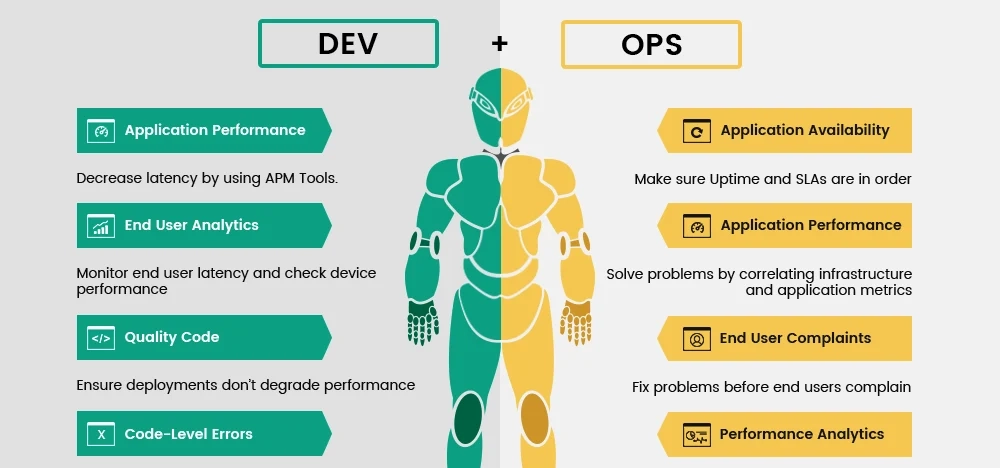DevOps stands for two approaches: software development ("Dev") and IT operations ("Ops"). DevOps engineer was not a job title just some time ago. However, within the recent years, this field has risen and grown quickly. Based on LinkedIn, this was one of the most demanded roles in 2018.
Today, despite the COVID pandemic and the resulting economic slowdown, HRs are looking to hire even more DevOps and engineers with cloud expertise. Technological organizations continue adding this role to their inventory in 2021. It makes DevOps engineering one of the highest-paying remote jobs on the market. This is an important statement for engineers interested in picking up new skills. They have the potential to become more attractive to HR managers and increase their earning prospects.

What exactly is DevOps from a hiring perspective?
Each company understands DevOps differently. Starting from automating simple deployment processes to orchestrating sophisticated, multi-cloud infrastructures. For instance, a new startup might see DevOps as someone who wears many hats to expedite product development through rapid deployment cycles, focusing on continuous integration and deployment (CI/CD) to seamlessly blend development with operations. In contrast, a large enterprise may interpret DevOps as a strategic initiative to enhance collaboration between previously isolated development and operations teams. With a broader focus that includes not only automation but also culture change, process improvement with heavy emphasis on security practices or so called (DevSecOps) to navigate complex regulatory landscapes and legacy systems.
That's why recruitment companies must first understand what each organization means by DevOps. This should include tech stack the candidate should be proficient in, their responsibilities, and the broader cultural and operational context. Moreover, a staffing agent should do a deep dive into the company's DevOps practices and philosophy, ensuring they match candidates not just with the right technical skills, but also with the right mindset to thrive in the particular version of DevOps the company practices. These steps are the key to understand, describe and realize before starting to hire a DevOps candidate.
DevOps Responsibilities
DevOps main function is to bridge gap between software development and operations functions. Firstly, DevOps developers ensure that the company has so called CI/CD pipeline that stands for Continuous Integration and Continuous Deployment. These comprise implementation of automated software build, test and deployment procedures. In addition, they manage version control systems as well as organize deployment techniques, making sure that code revisions are dispatched to test, staging and all the way to production environments.

The other important responsibility is Infrastructure management, commonly used in the name of Infrastructure as Code (IaC). Such processes include automating, configuring, and managing servers, databases and other infrastructure elements, which can be repeated and automated. Monitoring and logging are also critical; DevOps engineers establish and maintain monitoring systems, to track the applications and infrastructure performance, ensuring any problems are quickly identified and addressed. Also, they focus on system reliability and efficiency, continually trying to find ways to maximize efficiency and minimize resource consumption.
Overlap with SRE
While DevOps focuses on the seamless integration of development and operations, SRE (which stands for Site Reliability Engineer) dedicates their attention to high system reliability. Sometimes the overlap between DevOps and SRE significant, so the companies confuse the two. Particularly when it caome to automation and continuous improvement. Both roles implement CI/CD pipelines and IaC to streamline workflows and maintain system infrastructure efficiently. Monitoring and performance optimization are also common ground, with both DevOps and SRE engineers utilizing specialized tools to ensure system uptime and quickly address any service disruptions.
However, SRE introduces specific practices such as defining Service Level Objectives (SLOs) and error budgets, which provide capability for measuring overall reliability. This approach overlaps closely with DevOps responsibilities but adds a layer of reliability-centric metrics.
Overlap with DevSecOps
The principle of DevSecOps goes even further than DevOps. It concentrates on the security practices for every life cycle of software. The point where DevOps and DevSecOps meet is security orientation. Similar to DevOps engineers, DevSecOps practitioners embed security into CI/CD pipelines, making sure that security testing becomes an integrated part of the development.
This includes security scanning tools, vulnerability assessment and compliance monitoring. DevSecOps is also concerned with the relationships between these typically disjointed areas: development, operations, and security.
Summary
In summary, DevOps is now a corporate term and is here to stay. Over the last five years, tens of thousands of organizations have adopted DevOps in their teams' composition. Yet, the biggest enterprises will need to have teams of DevOps engineers. The DevOps department will manage and improve their infrastructure and maintain the software development lifecycle. Their future career potential is bright and grows day by day. From startups to enterprises, companies use clouds such as AWS, GCP, and Azure that increases demand for DevOps.
While DevOps, DevSecOps, and SRE share a lot of ground in terms of their approaches and objectives, it's critical for hiring managers to recognize their distinct nuances. Making these distinctions clear during the hiring process ensures that the right talent is brought on board, perfectly in tune with an organization's specific needs and culture.

